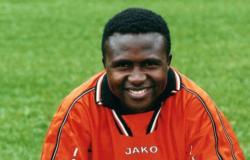IIn our country, one in three marriages ends in divorce, and this applies to half of the relationships among couples who live together. ‘A gigantic group of people who have been struggling for a long time,’ says relationship therapist Rika Ponnet. ‘Grief and old pain can suddenly overwhelm you, even after years.’
Why the pain of a divorce lingers for so long is something that science is also looking into. ‘A fairly new view is that it is a grieving process, but no one dies,’ says Esther Kluwer, professor by special appointment of sustainable relationships and well-being at Radboud University and Utrecht University.
‘A partner is an important bonding relationship, so a divorce has a big impact. You lose much more than just that partner: part of your children’s lives, friendships, the bond with your in-laws and sometimes also economic security, especially for women.
Although there are also advantages: people decide to pick up a hobby again, there is more autonomy, new friendships or existing social relationships receive more attention. So there is not only loss, but that has the upper hand in the first period.’
Distance needed
Recognizable for Veerle (53), who split up with the father of her two children, now young adults, four years ago. Such a process takes time, she experienced. She and her ex-partner try to complete their story through a SCHIP process, a post-relational grieving process that ex-partners go through together.
‘For me, the loss of the divorce is particularly great, losing my family in particular had a big impact. I really lost myself and it took a lot of time to get back on track. Only after I found myself again was there room to see how I could deal better with my ex-partner.’
‘Four years after the divorce, we started a SCHIP process to restart communication between us, with the children in mind. Even though they are young adults, it is difficult for them if they are the messengers of things that are meant for me.’
‘In our case the process is difficult because talking about feelings does not work well. That was already the case during our marriage and we will take that with us. I don’t know if we will manage to go through all the phases, I still hope so because I have the feeling that our story is not finished.’
“What is so difficult about a divorce is that the loss is incomplete,” Kluwer continues. ‘To detach yourself properly, you need distance. Especially if there are children, the bond cannot be cut completely because of the care and upbringing that is still shared.’ Kluwer does not advocate less contact between parents and children, but she does point out that children complicate the grieving process.
Although that does not mean that couples without offspring have an easier time if their relationship ends. Ponnet sees that divorce without children can just as well leave a huge hole. ‘These couples also give up on dreams, their vision of the future with two people dying or a desire to have children that for whatever reason could not be fulfilled can be very painful.’
Fierce conflicts
If those children do exist, parents may find it difficult to tackle their task as parent together after a divorce. A reason why some ex-couples end up in fierce conflicts. Esther Kluwer is busy with her own research on this theme. The first results show that it is important to conclude the relationship properly before continuing as a co-parent.
A possible approach to dealing with loss is SCHIP, developed by grief and relationship therapists Tineke Rodenburg and Leoniek van der Maarel, who conducted five years of practical research into this method.
‘The process is always completed together by the ex-partners. Partners learn to listen to the injuries they have caused to each other – unintentionally, but still. The goal is for them to reconnect afterwards, as partners in parenthood,” they say.
In their research they saw that in more than two-thirds of the 1,175 divorced couples, a contested divorce was prevented and the children had better functioning parents. ‘For us, conflict is the translation of the pain of loss, the grieving process. Often one of the partners is blamed. Because he was unfaithful or had been thinking about divorce for some time. But the person who took the initiative for the divorce is also grieving just as strongly.’
Avoiding arguments
Science agrees that if parents want to do something good for their offspring, the key is to avoid conflict, Kluwer says. ‘It doesn’t matter whether conflicts occur inside or outside the relationship, they are harmful. And if there are disagreements, it is best to avoid them happening in the presence of the children.’
Why not avoid arguments and still stay together for the children? “That’s such an outdated concept,” Ponnet says. ‘In previous generations people did that, but it was often bitter misery behind the front door. In my practice I hear the painful stories of adults who grew up in such a context.’
If children have such a key role, it seems strange that they are only addressed in the final phase of the SCHIP approach. Especially because the aim of the program is to get parents talking to each other again.
Forgiveness
According to van der Maarel and Rodenburg, this is not so illogical: ‘People have to complete their relationship as partners and that relationship already existed before the children. As partners they have a completely different role than as parents. Only when trust is restored can parents work together again for the children.’
One of the major obstacles in conflicts is that ex-partners and those around them take a black-and-white position towards each other: the ex-partner is the devil. Don’t do it, says science. ‘Research is very clear about this,’ says Esther Kluwer.
‘Saying and thinking ugly things about your ex-partner is a negative factor in co-parenting. Forgiveness is a very important step in not getting stuck in a conflict. This sometimes requires looking at the underlying losses and understanding each other.’
Angry for 90 seconds
In the SCHIP approach, those angry, devilish thoughts are given a place in the therapy room. ‘We give space to all emotions, even things that are not constructive. Partners are given the opportunity to express their bile. Both.’ It is hard work, the therapists admit, and there is certainly a fear that people will take their anger too far.
‘It helps to know that people are only angry for 90 seconds, then they take a breath and then they repeat what they are so furious about. As a practitioner, this is the time to listen carefully, you will find out what really the point is. Partners often have the same feeling: they don’t feel heard. If they notice that people are listening, the anger will automatically decrease.’
After ventilation comes the crucial step to move on: ‘Here they can acknowledge each other’s pain, but that has not been possible at home at the kitchen table for a long time, because it is not safe there. It is very valuable when a partner can say: if I could do it again, I would never have done it this way. Of course, this is not always possible, some conflicts are so hardened that couples do not manage to complete the process.’
If you feel that you are navigating a conflict situation, it is good to get help quickly. You can also start a SCHIP process years after the divorce, but the therapists’ advice is to start it as soon as possible. ‘In this way we avoid that a lot of damage has already been caused by conflicts. After a SCHIP process, the mourning is not over, but the foundation has been well laid and people can look beyond the anger and conflict.’
Incredibly moralizing
Not only an ex-couple has work to do, society can also do more to make the divorce less difficult for parents and children. ‘I have been working with people who are divorced for thirty years, but you only know what it really is when you go through it yourself. We made it possible to divorce, but I find the moralizing that still lingers exasperating,” Rika Ponnet emphasizes.
‘I don’t really understand it, everyone today has someone in the family who is divorced and yet there is so much divorce shaming. Can we please stop thinking so morally about this? I see what guilt does to people’s self-esteem and it is also not good for contact with the children.’
According to Rika Ponnet, how you can play a meaningful role as a family, in-laws or friend is not that difficult. ‘Gentleness and recognition contribute so much. There are, just like in any period of mourning. Just say: ‘come here, sit down, tell me.’ This gives you the feeling that you are on their side, that they can crawl on your lap for a moment.’
(The morning)






